Orange County equestrians unite

SIGN OF THE TIMES: Young equestrians joined the April 25 demonstration at Costa Mesa City Hall against proposed boarding fee hikes at the Orange County Fairgrounds Equestrian Center. (Courtesy photo)
Boarding rent hike stirs equestrian center protests at OC Fairgrounds
From staff reports
COSTA MESA — Equestrians of all ages, sizes and disciplines — many with their horses in-hand — gathered outside Costa Mesa City Hall April 25 in protest of stabling rent increases at the Orange County Fairgrounds Equestrian Center. It was the most recent of multiple demonstrations over the past 18 months by local equestrians who are concerned that the big rent increases would impact and eventually lead to the closing of the facility altogether.
The effort came during a scheduled meeting of the Orange County Fair & Event Center’s Board of Directors.
Temecula celebrates new KenTina Trail

Newest leg of Wine Country Trails gets well-attended ribbon-cutting
Special to the Horsetrader
TEMECULA — Temecula Valley Rural Lifestyles, Inc., a non-profit organization committed to preserving and enhancing equestrian lifestyle in their special Riverside County region, hosted a dedication ceremony March 27 for the newest segment of the Wine Country Trails Network, the KenTina Trail.
Family, friends and equestrians on horseback gathered along Los Caballos Road to commemorate the naming of the trail for Galway Downs owners Ken and Tina Smith, two leading equestrian supporters. The Smiths, who acquired Galway Downs in 2010, earned naming rights to the trail by virtue of the winning bid in last year’s TVRL Fundraiser Gala auction.
Happy Trail!
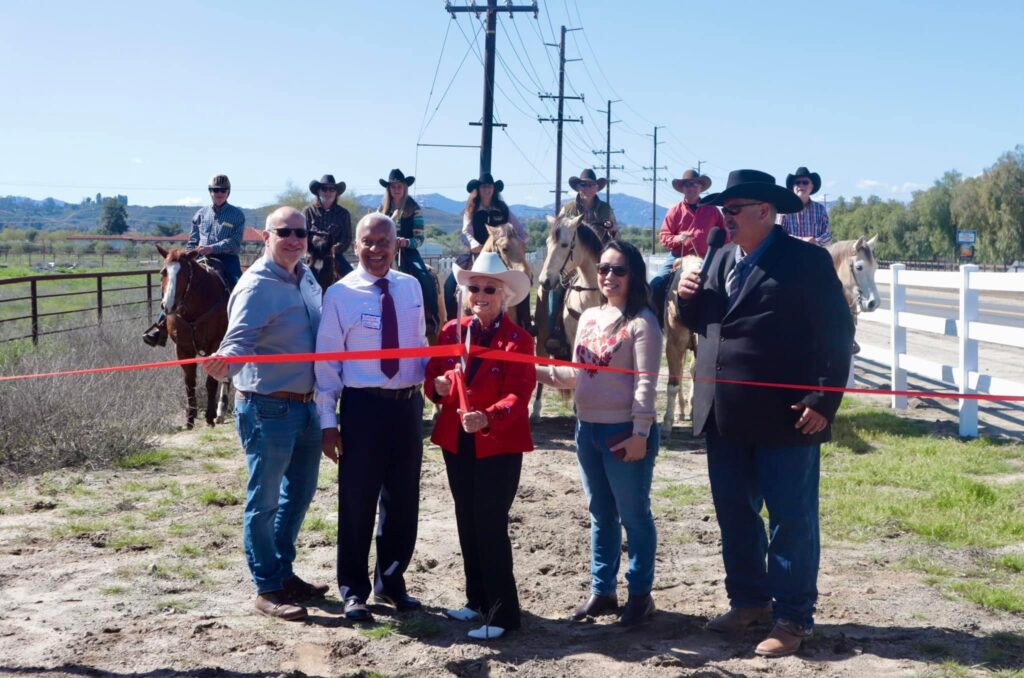
After a long ride to completion, Temecula trail advocates celebrate
From Horsetrader staff reports
TEMECULA — Travelers along DePortola Road aren’t accustomed to big commotions on a Thursday morning, but there it was on Feb. 22: dozens of observers, several dignitaries, a mounted posse, even media.
It was a ribbon-cutting ceremony for the new Pat Ommert Trail. After 15 years of dedicated work, the stars had finally aligned and the 2.3-mile trail through Valle de los Caballos, linking Anza Road to the vineyards, would officially open.
The brightest star, legendary horsewoman and lifelong horse advocate Pat Ommert, arrived promptly at 11 a.m. — pulled at age 94 by a team of draft horses instead of Roman Riding them as she gracefully did for decades. When she cut the ribbon, flanked by Riverside County officials including Supervisor Chuck Washington, about five dozen supporters, sponsors and trail users cheered.
Getting the Scoop
Educating users on trail manure aids communities
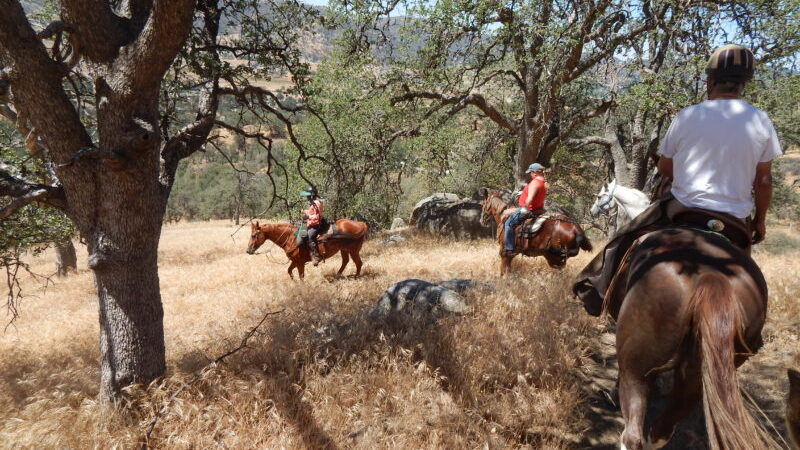
By LYNDALL ERB, PHD. / courtesy of ELCR.org
Horses have been a critical part of human progress from the early days of our history. They have carried men and supplies in times of war and peace, pulled the plows of farmers’ fields and were the main source of transportation during the settlement of the American west. Horses were the backbone of farms, the transportation to town for supplies and social activities, and a family necessity. Historically, many trails were created by horses ridden by people who needed to get from point A to point B. Today those trails are a critical part of recreation in open spaces and parks.
Ease into easements
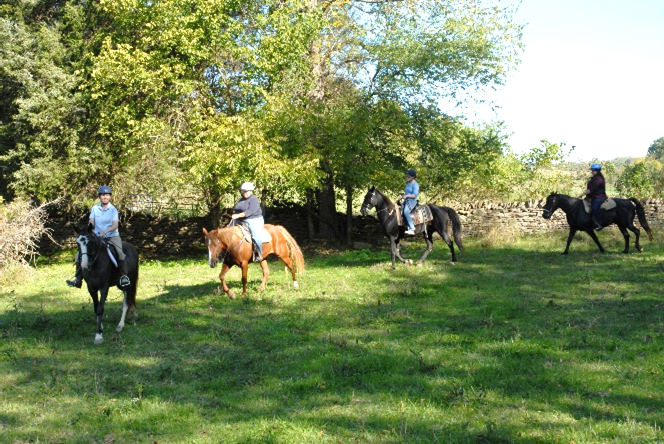
How trail easements support equestrian access
By LAUREL A. FLORIO / Courtesy ELCR.org
So many aspects of equine activities, such as sport horse training, ranching, or recreational riding, rely on large areas of land — be it for grazing, riding arenas, turn-out or, to a smaller degree, trail access.
Sometimes land-locked areas provide fabulous multi-use opportunities for riders to enjoy the trails. However, access often is restricted to trailer parking gateways, so the need for trail access over privately-owned land is essential to equine use. The lack of this access can minimize trail availability.
Trails are Common Ground
ELCR joins coalition launching nationwide trail etiquette campaign
Courtesy of ELCR.org
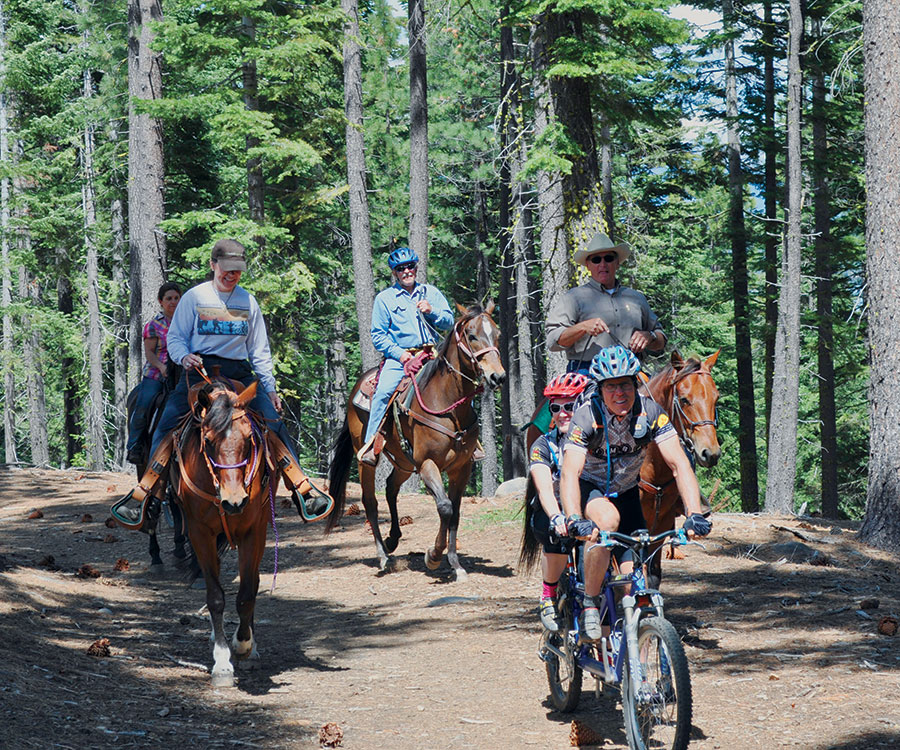
Any recreational trail user will tell you there are more people on the trails than ever before. At the onset of the COVID-19 pandemic in particular, automated counters at trail systems around the country recorded four times as many users compared to the same time frame in 2019.
Saddling up in San Marcos
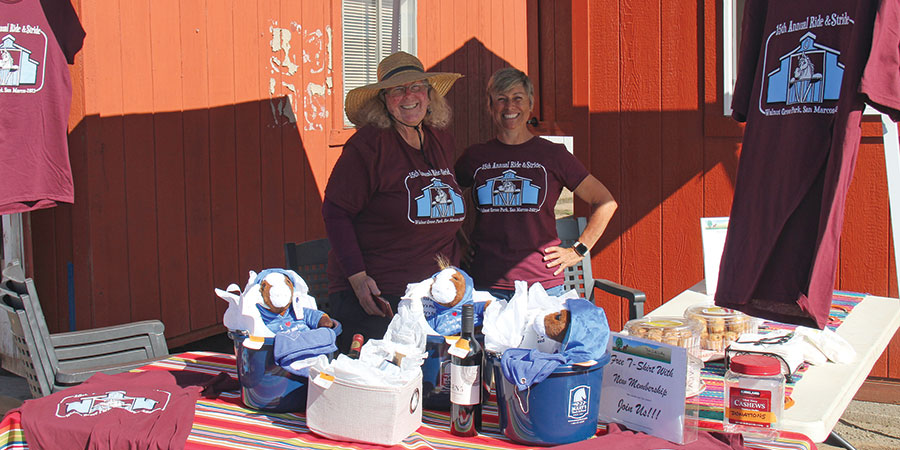
The Twin Oaks Valley Equestrian Association in conjunction with the Horse Heritage Conservancy brought together current — and future — equestrians to the 15th Annual Ride & Stride Oct. 17 at Walnut Grove Park in San Marcos. The event encouraged the “two-legged” contingent to join in and bring their other best friend to stride a three-mile loop through the valley on City of San Marcos trails. Participation in this event helped the Walnut Grove Equestrian Park, a rare gem in the heart of the Twin Oaks Valley.
San Juan Capo City Council hears proposals for future of Rancho Mission Viego Riding Park
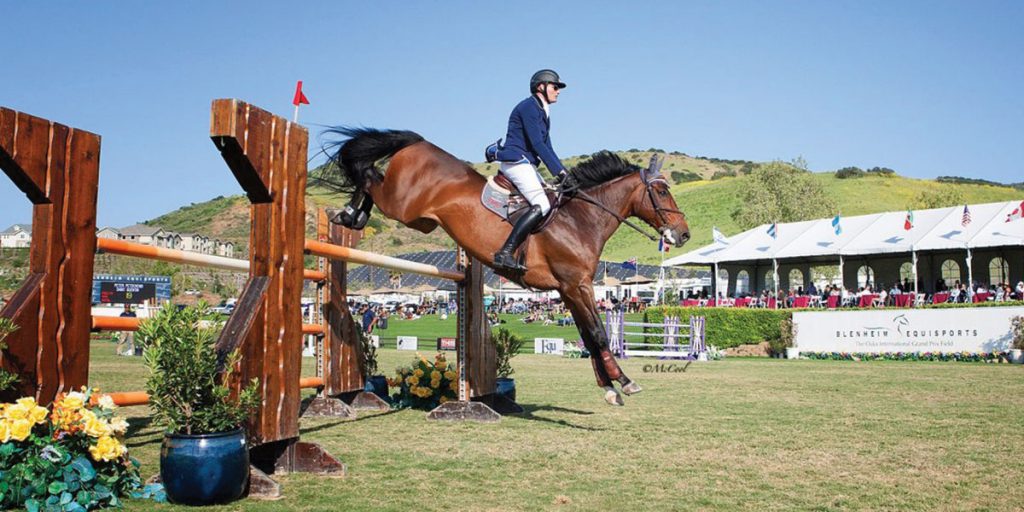
SAN JUAN CAPISTRANO — Two business groups with different visions for the 40-acre Rancho Mission Viejo Riding Park made respective public presentations Sept. 21 to the City Council, as ongoing discussions continued toward the beautiful facility’s future.
How is your ranch’s ‘BMP’?
Stay abreast — or ahead — of environmental rules
By Jamie Cohen Wallace / courtesy ELCR.org
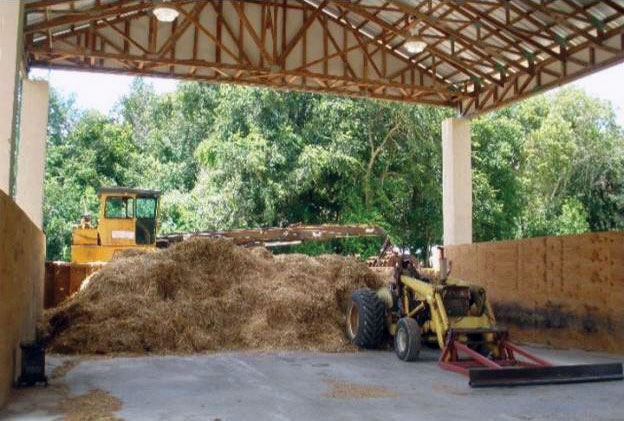
In recent years, Best Management Practices (BMPs) have essentially become standard for horse farms/facilities across the country. Meant to protect the ground and surface waters, BMPs are excellent management practices that should be utilized by every horse farm and facility to stay in compliance, regardless of legislation.
Seven Steps for Horsetowns
These keys open doors to equine-inclusive communities
By Danielle Bolte / courtesy ELCR.org
Horses bring many benefits to our local communities including economic, ecological, and aesthetic, and they enhance our general health and well-being. Plus, horses can be local economic drivers; according to the American Horse Council 2005 National Economic Impact of the U.S. Horse Industry Study, the equine industry accounted for 460,000 full-time jobs with an annual impact of $39 billion annually to our economy, generating $1.9 billion in taxes.
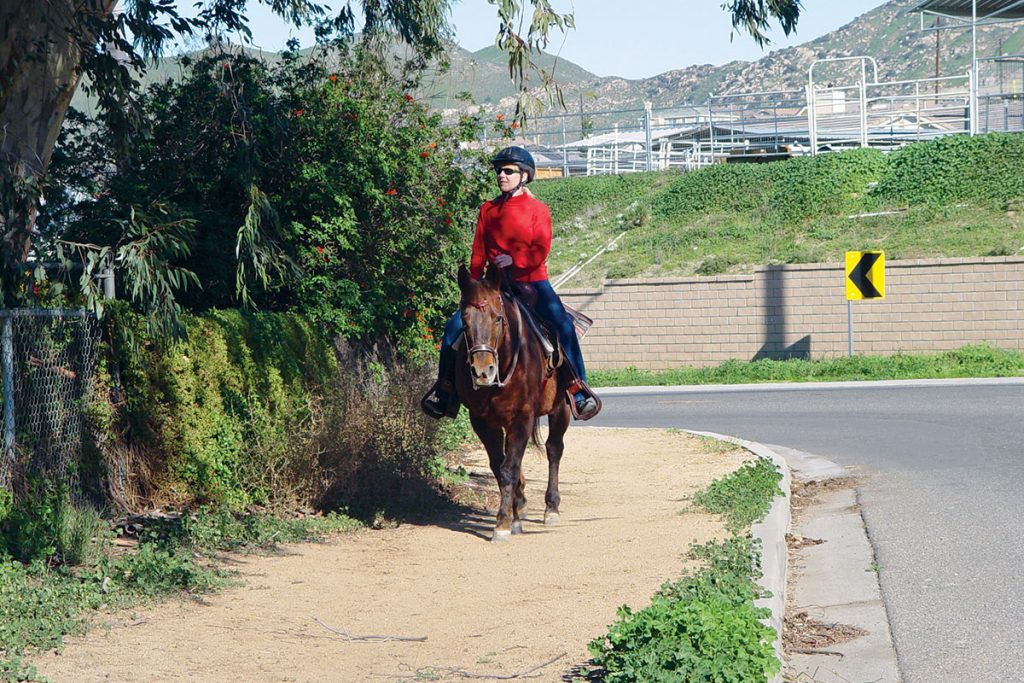
Also, horses and the beautiful scenic vistas that horse lands provide contribute greatly to our communities and our quality of life. It is important to note, though, that horses cannot provide these benefits without the land to support them. Increasingly, both horsemen and non-horsemen have witnessed open areas that were once horse lands taken over by development. According to the 2012 USDA Census from 2007 to 2012 the number of horse ranches decreased by 14% (71,146) and the horse population decreased by 11% (407,479). Poorly planned, uncontrolled development or sprawl, population growth, and a citizenry that is increasingly unfamiliar with livestock are the greatest threats to equestrians and horse land owners today.
While premier horse facilities, competition and recreational riding venues can exist close to (and even in) cities, local land use planning must purposefully incorporate them. By including horses into the land use planning process and making communities equestrian-friendly, planning departments can encourage horse owners to remain in the area or possibly move to the area for the provided amenities. Here are seven steps that can help incorporate horses into the land use and community plans.
STEP 1: Know Your Equestrian Community.
The shape of the local horse industry will determine what types of facilities are necessary. Understanding what types of equestrian uses are present in the area and where they are located is an essential knowledge base for future planning, but one that many communities are lacking. Horse owners are not a uniform body; the equine industry ranges in scale from the backyard horse owner to large show facilities and racetracks. In addition, horses are used for many purposes, ranging from companion animals to trail and endurance horses to show and race horses. For example, areas with large populations of recreational trail riders may have more need of well-maintained trail systems than areas with a high population of racehorses or gaited show horses.
STEP 2: Develop and Maintain Equestrian-Friendly Trail Systems.
Recreational and trail riding are the most popular uses of horses, with nearly 4 of the 9.2 million horses in the country used solely for this purpose. Therefore, one of the most widely attractive amenities that can be provided to horse owners is a well maintained and horse-friendly trail system.
What makes a trail system “equestrian friendly?” First of all, there must be ample space to park and turn horse trailers around. A few stalls or paddocks may not be amiss in well-used areas, especially where camping is also a possibility, but as a minimum there must be water available at the trail head, and possibly along the trail as well, depending on its length.
The trails themselves should be reasonably wide to allow for safe passage, and the footing should be natural, not gravel or pavement, to aid in traction and avoid bruising of the horses’ feet. When clearing overhead limbs from the trail, consider that a rider’s head is often eight feet or more from the ground, and clear the overhead space accordingly. Be sure trails are well-marked; pocket sized maps could be made available at the trailhead to complement marks along the route. Also, if trail systems are shared with other users, such as hikers with dogs or bicyclists, be sure that rules for shared use of the trails are clearly posted and enforced.
Maintenance of the trail system should include trimming of brush along the sides of the trail and occasional re-clearing of overhead branches. Footing should be maintained reasonably well, with washouts or other unsafe areas repaired, but the footing does not need to be maintained perfectly level in most cases.
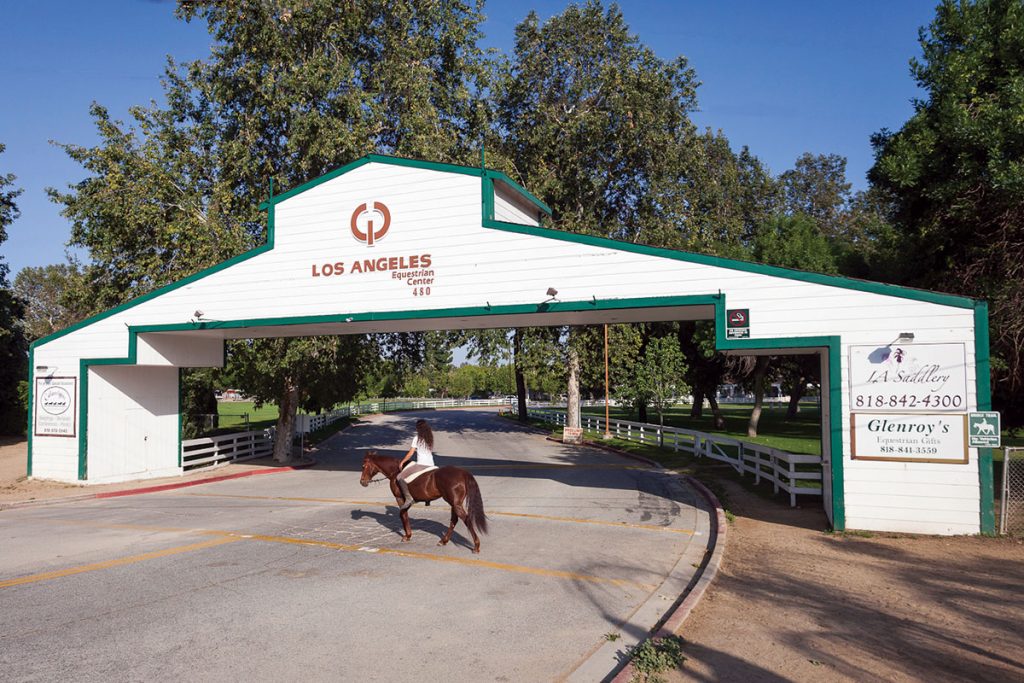
STEP 3: Create Equestrian Zones or Neighborhoods.
One of the best ways to avoid complaints about odor, dust, and loose horses is to cluster the horse farms near each other. In addition to avoiding neighbor complaints, this allows for the easy development of trails and equestrian facilities within these communities. In areas where horses are a large part of the history or culture of the community, equestrian zones can also be used as tourist draws. For example, an equestrian zone or neighborhood with a large population of young or competitive riders could be grouped around a county or city show facility, which could then provide the government with additional income.
STEP 4: Protect Agricultural Lands from Development.
One of the most important resources for horsekeeping is land. The protection of open space and agricultural land, of which horse farms are usually considered a part, is therefore vital to the maintenance of an equestrian community. In addition to pasture, space is needed for trails and competition arenas. Several ways exist to help protect these open lands, ranging from Transfer of Development Rights (TDR) programs to zoning definitions.
TDR programs are based on the amount of development allowed in the zoning code, with one zone designated as the sending zone, typically in a more rural area, which will remain more lightly developed than allowed, and a separate zone, usually in a more urban area, designated as a receiving zone and allowed to develop more densely, for example with five stories instead of three. Once the development rights are transferred from the sending zone, they are permanently revoked from the sending property, leaving the property rural in nature in perpetuity — at least in theory.
Urban Service Boundaries and Lot Size Restrictions are zoning-based means to protect the rural areas of the community. A hard urban service boundary, outside of which public sewer and water are not extended, can limit development outside of itself, encouraging the remainder of the land to remain largely rural while promoting denser infill development within the boundary, essentially encouraging a larger scale version of cluster development. Over time, the boundary is likely to expand, but use of such a boundary can help slow the sprawl of the urban and suburban land uses. Restricting lot sizes can also be a tool to maintain open space. A community-wide greenspace plan, defining which areas will remain open, is also a vital step in protecting these areas. Without a clear picture of what should be left as open space, it is too easy for development to sprawl outwards from an urban area.
STEP 5: Appropriate Codes and Ordinances.
Appropriate codes can be beneficial to the development of an equestrian-friendly community, helping to prevent friction between neighbors, especially where equestrian uses interact with non-rural uses. Beneficial ordinances encourage creation of space in the community. For the horse industry, regulations on the minimum lot size are reasonable, ensuring the provision of adequate space for the horse’s health and well-being as well as allowing space to buffer odors and dust from the neighbors. Similarly, regulations on the number of horses that can be kept per acre, or required buffers between barns, manure piles, and other features of equestrian facilities and streams and property lines may be necessary to avoid conflict and protect surface water quality. Ordinances such as these help equine properties maintain good relationships with their neighbors.
STEP 6: Enhance Public Awareness.
Improving public awareness of the horses in the community can help make trail-sharing safer and more effective and can help develop support for policies protecting agricultural lands from development. In order for a community to be truly equestrian-friendly, the rest of the area must be aware of the role that horses play in the local economic and ecological reality. Surveys can indicate the current level of public knowledge and support of horses in the community, and appropriate actions can be determined based on the results.
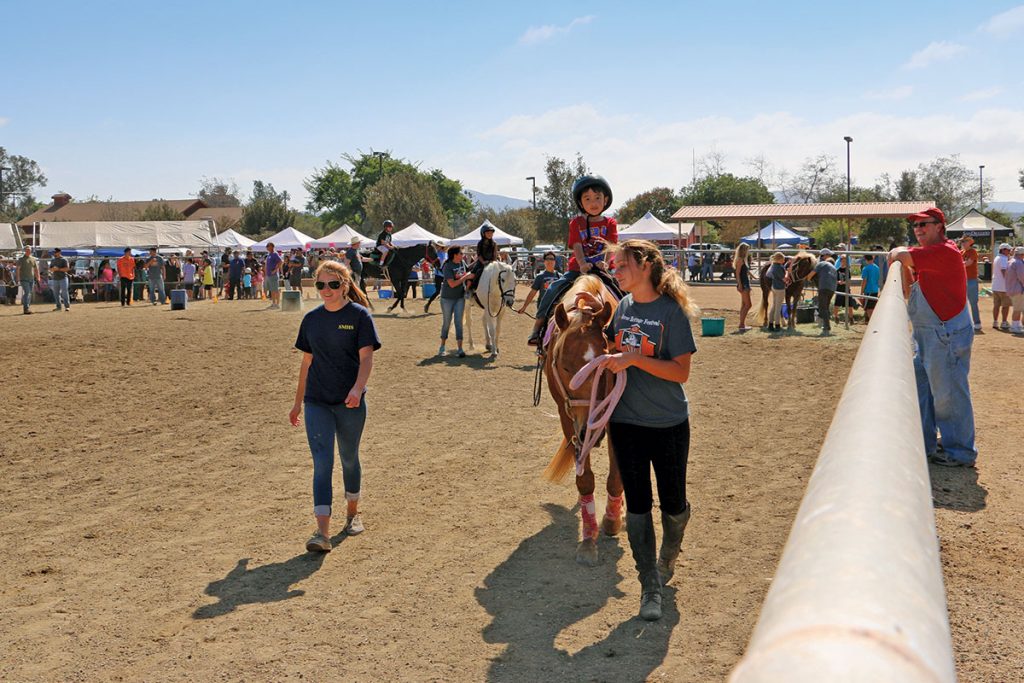
STEP 7: Incorporate Existing Facilities.
Create equestrian zones around existing professional farms and equestrian neighborhoods in areas that already have large horse populations. Even in transportation planning, the locations of these facilities can help determine the type of roads necessary, or the most viable locations for equestrian-friendly trails. When planning for horse-related land uses, refer back to the survey of the local equine industry suggested in step 1.
While not all of these steps will be appropriate for all communities, they do provide a buffet of options for the community planner to choose from in incorporating horses into the master plan. To truly serve the existing equestrian industry, efforts should also be made to reach out to local equestrian-oriented groups and non-profit organizations to gain their input on proposed plans or on areas in need of planning. Most national equestrian organizations, such as the United States Dressage Federation, 4-H, and United States Pony Club, have local chapters that can provide information on the equine industry and may provide a means for reaching out to the local equestrian community for suggestions. In addition, many non-profit organizations exist to encourage interfacing between the equestrian community and the planning community, including ELCR and Horses for Clean Water. Researching such organizations in your community will likely provide you the information you need to plan for your local equine industry effectively.
More online: http://bit.ly/09Aelcr


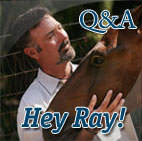
 Read Columns
Read Columns

